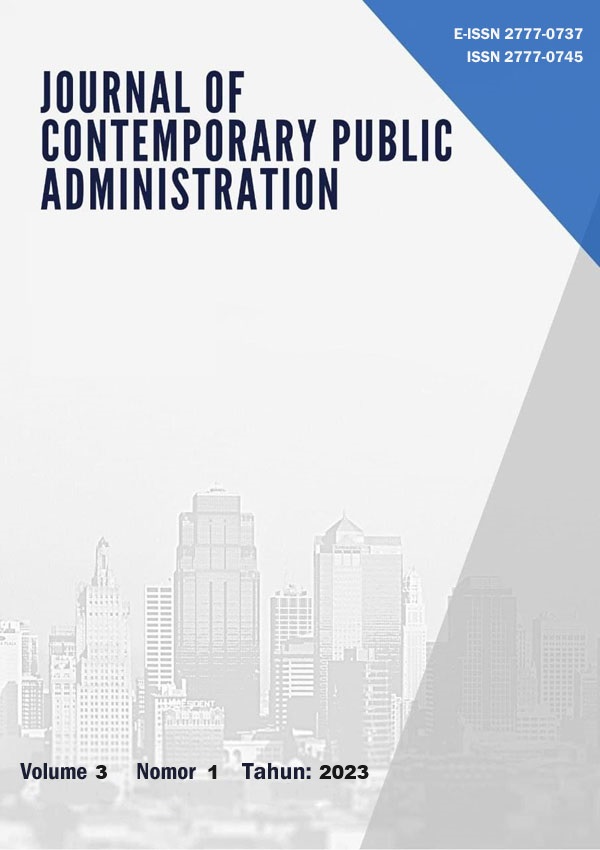Tata Kelola Wisata Pulau Gili Iyang: Perspektif Community Based Tourism
Abstract
Sumenep Regency has many diverse tourism potentials, a very prominent tourist destination in Sumenep Regency is island tourism. Gili Iyang Island is also known as “Oxygen Islandâ€, because it has natural tourism potential and high oxygen content potential (above 20% normal parks) compared to other regions in Indonesia (LAPAN). Gili I Island Tourism Development which requires community accessibility by playing an active and systematic role, the role of the community in understanding the management and utilization of tourism potential is very important in developing tourism in the region. Tourism management will be optimal if it is community-based. This study focuses on Tourism Governance of Gili Iyang Island: Community Based Tourist Perspective, by analyzing the level of participation of local communities on Gili Iyang Island in exploiting and developing tourism potential on Gili Iyang Island. Qualitative methods are used in this research method, and data collection techniques are in-depth interviews. Community Based Tourism theory Suansri (2003) is used in data analysis, with five principles of approach namely: (1) economic principles, (2) social principles, (3) cultural principles, (4) environmental principles and (5) political principles. The results of the study show that Tata managing tourism on Gili Iyang Island has been going well, as evidenced by the role of Pokdarwis in being able to create jobs in the tourism sector, increasing tourist visits to Gili Iyang Island. Environmental conservationists and the community can participate in tourism management, by becoming part of the Pokdarwis members.
References
Aida, V., Sumadyo, A., & Mustaqimah, U. (2017). Pusat Terapi Oksigen Dengan Penerapan Konsep Green Building Di Pulau Gili Iyang Madura. Arsitektura, 15(1), 133. https://doi.org/10.20961/arst.v15i1.11640
Creswell, J. W., & Creswell, J. D. (2017). Research design: Qualitative, quantitative, and mixed methods approaches. Sage Publications.
Fatmawati, D., Setyawan, D., & Miharja, F. J. (2018). Problematika pengelolaan ekowisata Gili Iyang : Perspektif community based ecotourism. 225–236.
Hiwasaki, L. (2006). Community-based tourism: A pathway to sustainability for Japan’s protected areas. Society and Natural Resources, 19(8), 675–692. https://doi.org/10.1080/08941920600801090
Iorio, M., & Corsale, A. (2014). Community-based tourism and networking: Viscri, Romania. Journal of Sustainable Tourism, 22(2), 234–255. https://doi.org/10.1080/09669582.2013.802327
Miles, M. B., Huberman, A. M., & Saldaña, J. (2014). Qualitative data analysis: A methods sourcebook. 3rd. Sage Publications, Inc.
Moleong, L. J. (2021). Metodologi penelitian kualitatif. PT Remaja Rosdakarya.
Musleh, M., Subianto, A., Tamrin, M. H., & Bustami, M. R. (2023). The Role of Institutional Design and Enabling Environmental: Collaborative Governance of A Pilgrimage Tourism, Indonesia. Journal of Local Government Issues (LOGOS), 6(1).
Nurhidayati, S. E., & Fandeli, C. (2012). Penerapan Prinsip Community Based Tourism (CBT) Dalam Pengembangan Agrowisata Di Kota Batu, Jawa Timur. Jejaring Administrasi Publik, 4(1), 36–46.
Sánchez-Cañizares, S. M., & Castillo-Canalejo, A. M. (2014). Community-based island tourism: The case of Boa Vista in Cape Verde. International Journal of Culture, Tourism, and Hospitality Research, 8(2), 219–233. https://doi.org/10.1108/IJCTHR-04-2012-0015
Suansri, P. (2003). Community based tourism handbook. In Community Based Tourism Handbook. https://www.mekongtourism.org/wp-content/uploads/REST-CBT-Handbook-2003.pdf
Subianto, A., & Kurniawan, D. C. (2017). MODEL INOVASI KOLABORASI PENGELOLAAN DESTINASI PARIWISATA SEJARAH MAKAM PENELEH DI SURABAYA. PROSIDING Seminar Nasional Administrasi Negara FIS UNP 2017, 22–31.
Sugiyono. (2016). Memahami Penelitian Kualitatif. Alfabeta.
Wirawan, R. (2019). SKRIPSI (30 maret)-HERSA.
 Abstract viewed = 689 times
Abstract viewed = 689 times
 PDF (Bahasa Indonesia) downloaded = 788 times
PDF (Bahasa Indonesia) downloaded = 788 times







1.png)



